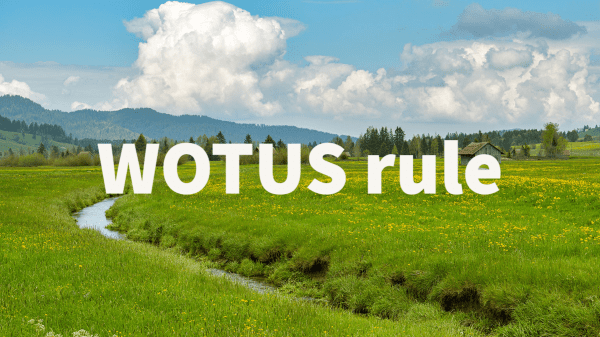Monday, March 20, was a significant date in at least one respect: it was the day when the revised Waters of the United States (WOTUS) rule took effect. At least it did in 48 states. The exceptions are Idaho and Texas.
That’s because a U.S District Court judge in Galveston, TX, has upheld a challenge to the new rules in those states. WOTUS struck down in two states (farmprogress.com).


Judge Jeffrey Vincent Brown of the Southern Texas District Court ruled that the two states had argued persuasively that the new regulations threatened their sovereign rights and could cause irreparable harm. But the judge also held that other courts should decide on the rules’ validity across the nation.
For a short history: the Clean Water Act (CWA) passed by Congress in 1972 authorized the Environmental Protection Agency (EPA) to regulate the cleanliness of the waters of the United States. But exactly what constitutes “waters of the United States” from a legal point of view has been a matter of dispute—and litigation—over the decades since.
In 2015, the Obama administration issued regulations regarding WOTUS that some interests—including many in agriculture—argued were too strict.
In 2019, the succeeding Trump administration issued rules that were more lenient, pleasing business and agricultural interests but infuriating environmentalists.
In 2022, the Biden administration in turn reinstated many features of the 2015 rules. For a concise description of the new regulations, see this EPA summary.
For the full regulations, visit this site.
Two criteria: (1) “relatively permanent, standing, or continuously flowing” bodies of water are considered WOTUS under the CWA; (2) a “significant nexus” would exist if a wetland “significantly affected the chemical, physical, and biological integrity” with a recognized WOTUS”: in other words, such waters would be governed under the CWA. The stipulation were spelled out in a famous Supreme Court ruling of 2006.
WOTUS definitions have been referred to the Supreme Court many times over the years. The current iteration is Sackett v. EPA.
In 2004, Michael and Chantell Sackett bought a residential lot near Priest Lake, ID. EPA told the Sacketts that they could not place fill on their lot because wetlands on the property fell under the CWA.
The Sacketts sued, and the matter went back and forth in courts over the years. In 2022, the Supreme Court agreed to hear the case again. They heard arguments in October, and the ruling will be issued with other Supreme Court decisions for the year in June.
Those objecting to the current WOTUS regulations argue that the Biden administration should have waited for the Sackett ruling, since it could significantly affect subsequent EPA policy.
To simplify the matter as much as possible, the 2019 regulations defined WOTUS more narrowly, meaning that more bodies of water on private property would be exempted from regulation. The 2022 rules define WOTUS more broadly, meaning that the term would apply to a larger number of bodies of water, so that more of them on private property would be subject to EPA regulation.
Plaintiffs in the Sackett case would like, among other things, to have the “significant nexus” criterion (first spelled out by Supreme Court Justice Anthony Kennedy) struck down.
A 2021 article in the William & Mary Environmental Law & Policy Review says, “The history of the debate over the meaning of these five words, ‘waters of the United States’ has been long, complex, and confusing. While the debate can be boiled down into questions like ‘what is an adjacent wetland’ and ‘what qualifies as a tributary’ history has shown that reaching answers to these seemingly simple questions is anything but. In the midst of this madness, [the late Supreme Court] Justice [Antonin] Scalia may have best described this controversy as ‘turtles all the way down.’” Turtles All the Way Down: A Clearer Understanding of the Scope of Waters of the United States Based on the U.S. Supreme Court Decisions (wm.edu)



